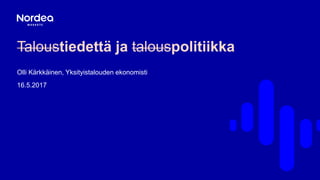Taloustiedett├ż ja talouspolitiikka
- 1. Taloustiedett├ż ja talouspolitiikka Olli K├żrkk├żinen, Yksityistalouden ekonomisti 16.5.2017
- 3. 3 Taloustieteen empiirinen vallankumous 0% 10% 20% 30% 40% 50% 60% 70% 80% 90% 100% 1963 1973 1983 1993 2003 2011 Teoria Teoria + simulointi Empiriinen: valmis data Empiirinen: oma data Kokeilu Taloustieteen top-journaaleissa julkaistujen artikkeleiden metodologia 1963-2011 L├żhde: Hamermesh (2013)
- 7. Talouspolitiikan tavoite on poliittinen kysymys (Talous)tiede voi auttaa tavoitteiden saavuttamisessa 7
- 8. ŌĆó Taloustiede on satua ŌĆō Taloustieteen mallit ovat yksinkertaistettuja paloja todellisesta maailmasta; jokaisella mallilla on opetuksensa ŌĆō Malleja on tuhansia: haasteena on valita kysymykseen parhaiten sopiva malli ŌĆó Taloustieteen empiirinen vallankumous ŌĆō Empiiristen tutkimusten m├ż├żr├ż on kasvanut, viime aikoina my├Čs kokeiluiden m├ż├żr├ż (esim. Suomen perustulokokeilu) ŌĆō Yh├ż useampi taloustieteilij├ż on filosofin sijaan ŌĆØputkimiesŌĆØ; keskityt├ż├żn yksityiskohtiin, pohditaan mik├ż toimii k├żyt├żnn├Čss├ż, muokataan j├żrjestelmi├ż tutkimustulosten perusteella ŌĆó Talouspolitiikan l├żht├Čkohtana on arvot ŌĆō Taloustiede ei voi ratkaista optimaalista talouspolitiikkaa koska tavoitteiden asettaminen on politiikan teht├żv├ż ŌĆō (Talous)tiede voi auttaa kun pohditaan, mill├ż keinoilla tavoitteita kannattaisi yritt├ż├ż saavuttaa ŌĆō Taloustiede voi my├Čs kertoa mit├ż EI kannata tehd├ż ŌĆó Arvot + Tiede = Optimaalinen (talous)politiikka 8 Taloustiedett├ż ja -politiikkaa
- 9. Kiitos! Olli K├żrkk├żinen, Yksityistalouden ekonomisti olli.karkkainen@nordea.com Twitter: @OlliKarkkainen
- 11. 1. Economics is a collection of models with no predetermined conclusions; reject any arguments otherwise. 2. Do not criticize an economistŌĆÖs model because of its assumptions; ask how the results would change if certain problematic assumptions were more realistic. 3. Analysis requires simplicity; beware of incoherence that passes itself off as complexity. 4. Do not let math scare you; economists use math not because theyŌĆÖre smart, but because theyŌĆÖre not smart enough. 5. When an economist makes a recommendation, ask what makes him/ her sure the underlying model applies to the case at hand. 6. When an economist uses the term ŌĆ£economic welfare,ŌĆØ ask what he/ she means by it. 7. Beware that an economist may speak differently in public than in the seminar room. 8. Economists donŌĆÖt (all) worship markets, but they know better how they work than you do. 9. If you think all economists think alike, attend one of their seminars. 10. If you think economists are especially rude to noneconomists, attend one of their seminars 11 Ten Commandments for Noneconomists L├żhde: Dani Rodrik: Economics Rules: The Rights and Wrongs of the Dismal Science
- 12. 1. Economics is a collection of models; cherish their diversity. 2. It is a model, not the model. 3. Make your model simple enough to isolate specific causes and how they work, but not so simple that it leaves out key interactions among causes. 4. Unrealistic assumptions are OK; unrealistic critical assumptions are not OK. 5. The world is (almost) always second best. 6. To map a model to the real world you need explicit empirical diagnostics, which is more craft than science. 7. Do not confuse agreement among economists for certainty about how the world works. 8. ItŌĆÖs OK to say ŌĆ£I donŌĆÖt knowŌĆØ when asked about the economy or policy. 9. Efficiency is not everything. 10. Substituting your values for the publicŌĆÖs is an abuse of your expertise.ŌĆØ 12 Ten Commandments for Economists L├żhde: Dani Rodrik: Economics Rules: The Rights and Wrongs of the Dismal Science












